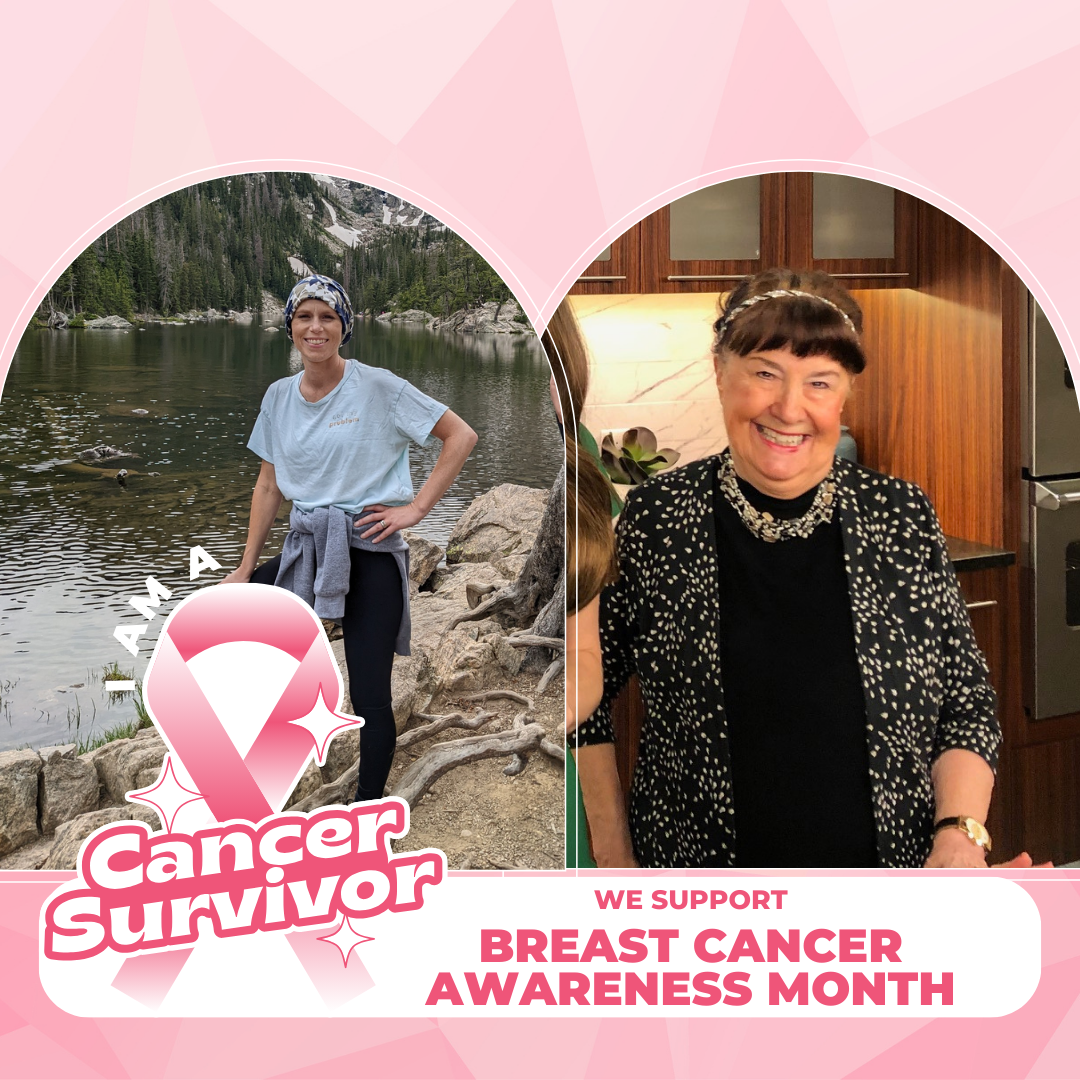Seattle Sutton RN, the founder of Seattle Sutton’s Healthy Eating, and Alyssa Salz MS, RD, LDN, the lead dietitian at Seattle Sutton’s Healthy Eating, are both breast cancer survivors. Seattle is a 23-year survivor and Alyssa is a 1.5-year survivor. Both women have maintained a healthy body weight, stuck to a healthy exercise routine, and ate a healthy diet throughout their lives but despite their healthy habits were both diagnosed with breast cancer.
Both women have experienced firsthand what it is like to be told you have cancer, go through rigorous testing and taxing treatments, and have their lives rattled due to the diagnosis and everything that comes with it.
Over the last two years, Alyssa has experienced how following Seattle Sutton’s Healthy Eating’s meal plans impacted her energy, helped with managing side effects, and provided convenience while running to and from Dr. appointments, going through surgeries, radiation, chemotherapy, and more. The meals helped her focus on fitting activity and self-care into her daily routine, decreased stress, reduced exposure to germs by eliminating time in the grocery store or at restaurants, and best of all she feels it had a big part in her treatment’s success.
New research confirms what Alyssa learned from her experience of eating right during her cancer treatment. The Yale Cancer Center performed a study on a diet and exercise intervention for women undergoing chemotherapy for breast cancer. They found that 53% of the women who received the intervention experienced a pathologic complete response (or disappearance of all invasive cancer cells in the breast) compared to 28% in the control group. They found that these women reported increases in exercise and fruit and vegetable intake.
Seattle and Alyssa are both proud to wear their badges of courage, share their stories to help others who are battling breast cancer, and are both dedicated to the mission of improving people’s eating habits and overall health. Even though a healthy lifestyle unfortunately cannot prevent all forms of disease, the research is clear that it does make a difference in survival, recurrence, and overall quality of life.
Breast cancer is the most common type of cancer among women. One in eight women (13%) will develop breast cancer in their lifetime. It is less common in men with approximately one percent of men developing this type of cancer. Per the American Institute for Cancer Research, it is expected that almost 300,000 new breast cancer cases will be diagnosed in 2023. On average, every 2 minutes a woman is diagnosed with breast cancer in the United States! The great news is that about 90 percent of those diagnosed will survive five years after diagnosis.
New research from the American Institute for Cancer Research shows lifestyle can have a very positive impact on breast cancer patients as it relates to outcomes after diagnosis and quality of life as it relates to:
- Diet
- Physical activity
- Body Weight
Let’s look at what they found in each of these areas.
Diet and Breast Cancer
The research revealed that a healthy diet has a positive association with breast cancer outcomes. Researchers looked at 108 different studies from around the world with over 150,000 women diagnosed with breast cancer. They found evidence that eating a higher fiber diet improved survival, specifically regularly eating whole grains, beans/legumes, fruits, and vegetables.
Soy and breast cancer has always been a controversial topic, but the researchers found evidence that regularly eating soy may reduce the risk of death and breast cancer recurrence. Including foods like unsweetened soy beverages, tofu, edamame, and tempeh may offer some protection. It is not recommended to eliminate soy from the diet, as it may reduce the risk for reoccurrence, even in people with estrogen receptor-positive cancer.
Physical Activity and Breast Cancer
The new report included evidence that regular physical activity improves survival and lowers the risk of getting breast cancer again. They looked at 23 studies worldwide with over 39,000 women with a breast cancer diagnosis and looked at running, walking, and aerobics and the outcomes for those with a more active lifestyle.
Beyond improving outcomes after diagnosis, regular exercise after a breast cancer diagnosis can also help in many other ways during and after treatment, such as:
- Reduce side effects such as fatigue, weight gain, bone loss, and lymphedema.
- Decrease risk for cardiovascular disease and other health conditions.
- Improve mental health by reducing stress, depression, and anxiety.
In AICR’s report, the researchers also looked at how exercise can improve breast cancer survivors’ quality of life and found that women with a more active lifestyle had improvements in their “health-related” quality of life. This included general health, physical well-being, and everyday functioning.
It is recommended that breast cancer survivors aim to get the same amount of physical activity recommended to the general population by the CDC. Aim for at least 150 minutes of moderate activity each week and muscle strengthening activities at least 2 days a week. Some examples of activities to try include brisk walking, cycling, or swimming, and strengthening using resistance bands or light free weights.
Body Weight and Breast Cancer
Finally, the study evaluated the role of body weight following a breast cancer diagnosis. They looked at 226 studies that involved 456,000 women and found strong evidence that a higher body weight after diagnosis increased the risk of death. This gives even more reason to focus on a healthy diet and add in regular physical activity.
Key Takeaways
It’s important to remember that this research did not find that you needed to follow a restrictive or complicated diet. It did not find that you need to be in the gym every day or spend lots of money on memberships or supplements. It found that incorporating an overall lifestyle that focuses on balance, good quality nutrition, enjoyment, and patterns that can be maintained for a lifetime were the most important.
This new research reinforces Alyssa's and Seattle’s healthy habits and reignites their mission to help others through sound nutrition information with no fads, gimmicks, or unnecessary restrictions.
The team at Seattle Sutton’s Healthy Eating urges you to be vigilant and proactive about self-breast checks each month, annual mammograms, and focusing on a healthy lifestyle – good eating habits, low alcohol consumption, and an active lifestyle, all of which have been shown to have an impact on this disease.
We also can be supportive of those stricken with breast cancer, helping where needed and when not necessarily wanted. Sometimes it’s difficult for busy, active women to seek help or assistance – even when undergoing surgery, radiation, and chemotherapy. Women are not accustomed to seeking help, but by being supportive and helpful we can allow them to focus on themselves and their health. It also helps them in their fight not to have to worry about what’s for dinner, who’s picking up the kids, or how they are going to get the laundry done or the groceries purchased.
We can all be supportive of the American Cancer Society, the preeminent cancer organization that truly has a mission to lower cancer rates and improve treatments. Their sole mission to eradicate cancer has been going strong for more than 100 years. They are the reason we have more survivors than ever before.
We share this research and our personal stories to give others hope for survival. To help people feel confident in their own power to make a change for themselves with healthy eating, staying active, and being positive. Remember, you don’t have to face breast cancer alone, we are here to help you along your way!











 Weight Loss
Weight Loss Health & Wellness
Health & Wellness Diabetes
Diabetes Heart Health
Heart Health Motherhood & Family
Motherhood & Family Dietary Restriction
Dietary Restriction Other Health Conditions
Other Health Conditions About Seattle Sutton
About Seattle Sutton